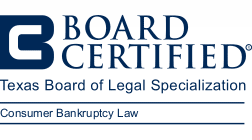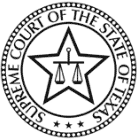Repossession and Bankruptcy for Texas Co-Signers
 Perhaps you agreed to co-sign a loan for a friend or family member, never expecting to be dragged into financial chaos. Unfortunately, co-signing for a loan is a much more serious act than most people realize. If the primary borrower defaults on a loan you co-signed, you could be facing aggressive collection calls and repossession threats. If either you or the primary borrower files for bankruptcy, the situation becomes much more complex.
Perhaps you agreed to co-sign a loan for a friend or family member, never expecting to be dragged into financial chaos. Unfortunately, co-signing for a loan is a much more serious act than most people realize. If the primary borrower defaults on a loan you co-signed, you could be facing aggressive collection calls and repossession threats. If either you or the primary borrower files for bankruptcy, the situation becomes much more complex.
Texas bankruptcy does offer some protection for co-signers, but it does not automatically wipe away financial responsibility or prevent repossession. It is important to consult with a knowledgeable Austin County, TX bankruptcy attorney to ensure you fully understand your rights, risks, and remedies when bankruptcy and repossession collide.
What Is the Role of a Co-Signer in a Texas Loan?
The most important thing to know about being a co-signer on another person’s loan is that while you likely have no ownership rights to the property, you are just as legally obligated to repay the loan as the primary borrower if he or she fails to make those payments. Your credit is affected by the loan, both positively and negatively, and you take on equal responsibility for the loan.
Lenders can pursue the co-signer for the full amount of the unpaid debt, including any accrued fees or interest. As a co-signer, you can be sued, have your wages garnished, or have your assets seized. While you may get some temporary protection when the primary borrower files Chapter 13 bankruptcy through the "co-debtor stay," this protection is not absolutely guaranteed and can be lifted if the primary borrower defaults on the repayment plan.
What Happens if You File for Bankruptcy as the Co-Signer for a Primary Borrower?
If you, as the co-signer, file for Chapter 7 bankruptcy in Texas, the primary borrower remains responsible for the debt. While your liability may be discharged in the bankruptcy, the lender can still pursue the primary borrower for the full loan amount and may even reassess the loan terms, potentially leading to higher interest rates or larger payments. Your Chapter 7 bankruptcy filing could potentially even appear on the primary borrower’s credit report, especially if the primary borrower has missed payments.
What Happens if the Primary Borrower Files for Bankruptcy and You Are the Co-Signer?
If the primary borrower files for Chapter 7 bankruptcy in Texas and you are the co-signer, you are likely to become primarily responsible for the debt. The lender can pursue you for the full amount owed, as the bankruptcy filing by the primary borrower does not release you from your financial obligation on the loan.
If the primary borrower files for Chapter 13 bankruptcy, which reorganizes his or her debts into a monthly payment plan that lasts 3-5 years, and the repayment plan is completed, the debt may be discharged, and you, as the co-signer, are no longer liable. If, however, the primary borrower does not successfully complete the repayment plan, you could still be held liable as the co-signer.
What About the Co-Debtor’s Stay Under the Primary Borrower’s Chapter 13 Bankruptcy?
As noted, the co-debtor's stay in Chapter 13 is not absolute. Under 11 U.S.C. § 1301, Chapter 13 bankruptcy offers some protection for co-signers of consumer debts from creditor actions to collect the debt, but there are some situations in which this protection for the co-signer can be modified or even terminated. If the Chapter 13 plan does not propose to pay the debt in full, a creditor can request that the court modify or terminate the stay to allow them to pursue the co-signer. If the creditor can show that the co-signer's stay would cause irreparable harm, the court can also terminate or modify the stay.
Contact a Brazoria County, TX Bankruptcy Lawyer
If you are a co-signer in Texas dealing with bankruptcy complications and foreclosure on behalf of the primary borrower, you need to speak to an experienced Brazoria, TX bankruptcy attorney. It is better to do this quickly, before your credit and finances are damaged, as well as to understand your exposure. Attorney Fealy is dedicated to helping good people during challenging financial times. To schedule your free consultation, call 713-526-5220.












